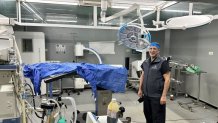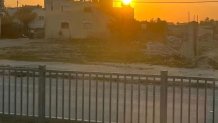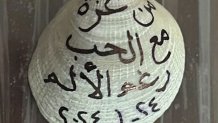On Thursday, the Palestinian Health Ministry announced a horrific new milestone in the Israel-Hamas war: More than 30,000 Palestinians have now been killed, most of them civilians.
The Ministry reported that about 70% of dead Palestinians are women and children.
That’s since Hamas’ surprise attack on Israel on October 7, in which some 1,200 people were killed and around 240 kidnapped, according to the Israeli government.
According to the Israeli military, 576 Israeli soldiers have been killed since Oct. 7.
Get top local stories in Philly delivered to you every morning. >Sign up for NBC Philadelphia's News Headlines newsletter.
Now 146 days into Israel's retaliation attacks, humanitarian workers in Gaza say thousands of people may still be trapped under the rubble, and about 70,000 people have been injured.
That's where Dr. Khawaja Ikram, an orthopedic surgeon in DFW, felt compelled to help. He signed up with the nonprofit MedGlobal, which conducts medical missions in Gaza under the umbrella and with the assistance of the World Health Organization.

"I know that I've been blessed with a skill set that other people need," said Ikram, who practices in Mesquite and Plano.
U.S. & World
Stories that affect your life across the U.S. and around the world.
The husband and father of four had a tough conversation with his family.
"Hey, this is an active war zone. This is a humanitarian crisis and these people are suffering. Anything that we can do to help out, even if it's for a few weeks, is probably best for us," he recalled telling them.
Ikram said he's gone on other medical missions before; Guatemala, Haiti, and Pakistan. But none like Gaza.
"I had the discussion with the kids and the wife that... this may be the last time that we see each other. But again, whenever time is written, we're going to go. So I said, 'What better way to go than serving humanity?'" Ikram said.
"It brings back all the memories that I had there," he said, scrolling through his phone as he sat with NBC Dallas- Fort Worth on Thursday.
Some of his memories heartwarming, like a child who gave him a shell with Arabic written on it. When he asked someone to translate it, he found out it said, "From Gaza, with love, despite the pain."
"I mean, I start crying," he said. "These people have nothing, but they still want to give you something."
Other memories are heartbreaking, like one day, when Dr. Ikram said the Israeli military had given them a green light, indicating it was safe to drive from the home they were staying in, to the European Gaza Hospital.
“So, we’re on the road in the van and we hear the bomb go off… maybe a block away," he said, showing a picture of the thick, black smoke.

They arrived at the hospital a few minutes later to a chaotic scene; an ambulance had arrived, and another civilian car, carrying bomb victims.
"The cars come with their family members who had been part of this bomb. So, we rush into the emergency room. We're just trying to do chest compressions, trying to save them, but unfortunately, the bombs that are going off are there to kill people. So from that standpoint, most of the time, not many people survive those," Ikram recalled.
Ikram said another time, a man came in carrying his five-year-old daughter, who had a single bullet wound to the head. He said they were displaced, trying to check on their home.
"He said, 'Supposedly the troops were pulling back. So, we thought maybe, let's go see what is still left over our house, see if there's anything left. There were snipers waiting for us. My five-year-old daughter was shot, and she's my only daughter, so please save her for us," Ikram recounted. "And of course, there's nothing we could do."
Another heartbreaking memory for the father was when a man came in with a little boy, around five years old.
"And he's like, 'I was just on the side of the road. I saw this child fall and hurt himself.' And we're like, 'Where's his family?' He's like, "He doesn't have any family. All of his family has been killed,'" Ikram said. "I can't fathom losing your whole family and being a five-year-old child, trying to raise yourself on your own."
Ikram, with more than 20 years of experience, also found himself handling new injuries.
"[When you see] a leg blown off, when you see shrapnel throughout the whole body, when you see parts of the scalp blown out from a single bullet shot, I mean, these are nothing that I ever have seen before," he said.
He said patients' wounds were slow to heal due to their lack of nutrition.
"It's surreal when, again, there is aid that's right across the border, literally five miles away from where it's needed and it's not being allowed to be brought into to them," said Ikram, who took a video of miles of aid trucks lined up at the Egyptian border with Gaza.
Israel, which had blockaded the enclave for 16 years, announced a full siege in October. Aid organizations say only a fraction of the help needed has been allowed in.
He also saw harsh living conditions, he said, with more than a million displaced people in tents, wherever they could find room-- from open fields to the side of streets, to inside the European Gaza Hospital, where Ikram worked.
Photos: North Texas doctor returns from Gaza medical mission
He said the hospital was built for 300 patients, and they were treating over 1,000 there, not including civilians crammed inside, seeking shelter.
"Even in the hallways... People are just trying to find some little space of refuge for themselves. Even as we're walking in the stairwells, people made their own little area on the stairwells, in the storage closets," he said.
Dr. Ikram said he hasn't forgotten Gaza's crowded corridors, as he makes his rounds here at home, three weeks later.
"When I saw the pain in these people's eyes and they said, 'This is the one thing we ask from you,' I decided to go ahead and do this story," he said.
He shares their message, "from Gaza, with love, despite the pain."
"I don't know how to change it other than to tell the stories that we need an immediate ceasefire and these people need our aid," he said.




